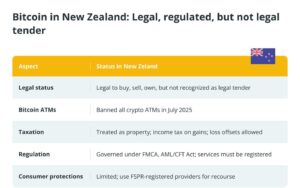New Zealand Bans Cryptocurrency ATMs in Major Anti-Money Laundering Crackdown
On July 17, 2025, New Zealand took a bold step in its fight against financial crime by announcing a nationwide ban on cryptocurrency ATMs. The decision, revealed by Associate Justice Minister Nicole McKee, specifically targets machines that enable cash-to-crypto transactions—tools that authorities say have become hotspots for money laundering and other illicit activity.
As of April 2025, more than 220 such kiosks operated across the country, primarily located in convenience stores, petrol stations, and laundromats. Many lacked robust identity verification measures, raising serious concerns among regulators. The ban follows investigations into high-profile criminal cases, including a $64 million laundering scheme and instances of cross-border drug trafficking, which exploited the anonymity of crypto ATMs.

Part of a Wider AML Reform
The ban is one component of a broader overhaul of New Zealand’s anti-money laundering and countering the financing of terrorism (AML/CFT) regime. Other key reforms include:
-
A NZ$5,000 limit on international cash transfers
-
Enhanced data-sharing authority for the Financial Intelligence Unit
-
Real-time transaction monitoring capabilities
Minister McKee underscored the government’s aim to develop a “smarter, more agile” regulatory system that protects legitimate businesses while cracking down on financial crime.
Industry Divided
The move has sparked debate within the cryptocurrency sector. CoinFlip, New Zealand’s largest operator of crypto ATMs, labeled the ban a “setback for digital innovation.” The company argued that targeted compliance measures—such as wallet pinning and pre-transaction risk assessments—could address criminal misuse without requiring a full ban. Their reaction highlights ongoing tensions between ensuring security and supporting emerging technologies.
Crypto Remains Legal—But Under Tighter Scrutiny
Despite the New Zealand Bans Cryptocurrency ATM ban, cryptocurrencies like Bitcoin remain legal in New Zealand. Classified as property, crypto holdings are subject to income tax, and individuals can still buy, sell, and store digital assets. However, businesses dealing with crypto must comply with stringent AML requirements, reflecting the government’s intent to integrate digital finance into traditional legal frameworks while limiting abuse.
Global Context
New Zealand’s stance aligns with growing international momentum toward stricter crypto ATM regulation. The UK implemented a similar ban in 2022, Singapore issued a moratorium the same year, and China has maintained a sweeping crypto ban since 2017. In contrast, Australia has opted for a lighter regulatory touch, imposing limits and enhancing compliance requirements rather than outright prohibition.
Looking Ahead
New Zealand’s comprehensive reforms signal a shift toward proactive AML strategies that prioritize both security and innovation. As countries around the world grapple with how best to regulate digital assets, New Zealand offers a compelling case study in balancing technological advancement with financial integrity.
Disclaimer and Risk Warning
coinweck does not endorse or is responsible for any content, accuracy, quality, advertising, products, or other materials on this page. The image used in this article is for informational purposes only and is provided to us by a third party. coinweck should not be held responsible for image copyright issues. Contact us if you have any issues or concerns. Readers should do their research before taking any actions related to the company.









